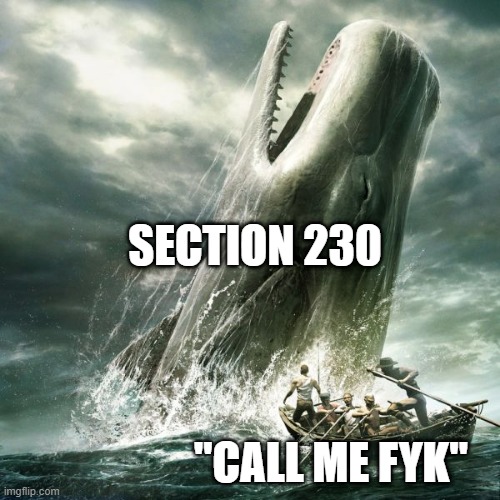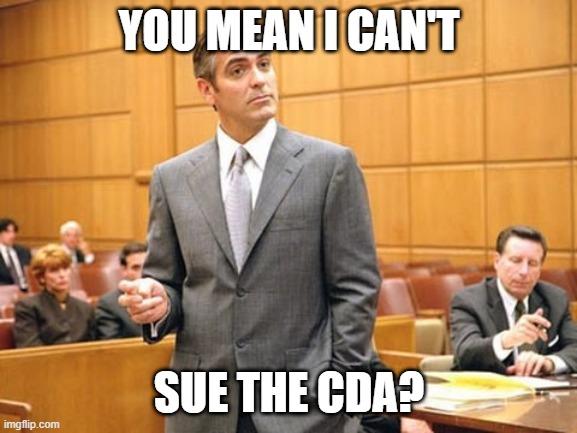It Turns Out You Can’t “Sue the CDA”–Fyk v. US
Jason Fyk’s recent litigation campaign reminds me of the classic story Moby Dick, with Fyk in the Captain Ahab role and Section 230 as his white whale. The Netflix documentary of his story will be called “Moby Fyk.”
In his complaint, Fyk says he published WTF (“Where’s The Fun”) Magazine that achieved success on Facebook, including 25M followers and hundreds of thousands of dollars of revenue each month. However, Facebook allegedly reduced his traffic 99% and removed pages totaling 14M followers. Why? Fyk claims Facebook retaliated against him because he didn’t advertise enough. (This article gives some background on Fyk’s story).
His lawsuit against Facebook was dashed by Section 230 in the district court. The Ninth Circuit quickly agreed and then denied his en banc request. The Supreme Court denied cert. Thereafter, he tried to vacate the district court decision, which triggered a new cycle of rejection by the district court, the 9th Circuit, and the Supreme Court.
Having exhausted his arguments in court twice, he launched a third expedition against Section 230. He sued the government to declare Section 230 unconstitutional. The judge’s response might be characterized as: WTF = What The Fyk?
 The court says the issue of standing to challenge 230’s constitutionality was already litigated and decisively resolved in AFDI v. Lynch, affirmed per curiam without a substantive opinion in Am. Freedom Def. Initiative v. Sessions, 697 F. App’x 7 (D.C. Cir. 2017). The court explains:
The court says the issue of standing to challenge 230’s constitutionality was already litigated and decisively resolved in AFDI v. Lynch, affirmed per curiam without a substantive opinion in Am. Freedom Def. Initiative v. Sessions, 697 F. App’x 7 (D.C. Cir. 2017). The court explains:
Mr. Fyk is entirely deficient on at least two of the standing prongs, traceability and redressability…Mr. Fyk’s alleged injury has no connection whatsoever to any conduct by the United States, the only defendant in this lawsuit. It stems entirely from Facebook’s independent action to restrict and remove his Pages….
If Mr. Fyk received his requested relief against the United States, what would change? The United States, which does not enforce Section 230, would continue not to enforce Section 230. Mr. Fyk would not be compensated for his apparent monetary losses. And Facebook would still be able to moderate content, including content posted by Mr. Fyk
With respect to traceability, the court explains:
[230] is a civil liability shield for private parties and does not enable, command, or delegate any state action. That the CDA is a federal law does not mean Mr. Fyk can bring a claim against the United States government; preventing such a flood of lawsuits is at the core of standing doctrine.
The court also notes that Facebook does not exclusively rely on Section 230 to authorize its content moderation decisions (“Perhaps Mr. Fyk envisions that Facebook would alter its approach to moderation if it knew it could not invoke Section 230 immunity, but Mr. Fyk presents no allegations showing Facebook would have treated his Pages differently in the absence of Section 230.”). For more on how the First Amendment would backfill Section 230–but only partially–if the statute were declared unconstitutional, see this paper.
The court summarizes the ultimate futility of this lawsuit:
Mr. Fyk eventually admits “the reality being that the actual defendant for all intents and purposes is the CDA.” That is the problem. Mr. Fyk recognizes he cannot sue the CDA, but neither can he sue the United States in its place. In the absence of an injury traceable to government action and redressable by a favorable decision, Mr. Fyk has no standing to bring his views on the CDA into this Court.
If Fyk’s past predicts his future, I assume we will see a DC Circuit affirmance and another cert denial before this particular lawsuit is over and the cycle begins anew. Fyk is already promising more activity.
Due to his dogged determination in the face of consistent futility, Fyk has become a great example of the Prager Effect. His efforts to blow up Section 230 keep generating 230-favorable law. 🙏
Case citation: Fyk v. U.S., 2023 WL 3933719 (D.D.C. June 9, 2023). The CourtListener page.
[Personnel note: Fyk’s attorney was Jeffrey L. Greyber. The court describes the complaint as “circuitous” and says it “often omits critical details.” The court also says “the meandering and lengthy Complaint was unhelpful in elucidating the nature of the claim” and “Mr. Fyk’s lawsuit does not accurately describe Section 230.”]


